
Opinion: A generation of the world’s best leaders has died. Now we must look forward
03:27 – Source: CNN
Is America in a downward spiral of political violence?
Editor’s Note: Jeremi Suri holds the Mack Brown Distinguished Chair for Leadership in Global Affairs at the University of Texas at Austin, where he is a professor in the History Department and the LBJ School. He is the author and editor of eleven books, most recently, “Civil War By Other Means: America’s Long and Unfinished Fight for Democracy.” He is the co-host of the podcast, “This is Democracy.” William Inboden is Executive Director of the Clements Center for National Security and Associate Professor at the LBJ School of Public Affairs, both at the University of Texas at Austin. He has previously served as a Congressional staff member, and at the State Department and National Security Council staff at the White House. His newest book is “The Peacemaker: Ronald Reagan, The Cold War, and The World On The Brink.” The views expressed here are their own. Read more opinion on CNN.
CNN —
Although the name-calling and political posturing leading up to this year’s midterm elections is disturbingly familiar, the times we live in are not. After seven decades of technological superiority, five decades of democratic stability, and three decades of military predominance, the United States now faces an era when none of these conditions can be taken for granted.
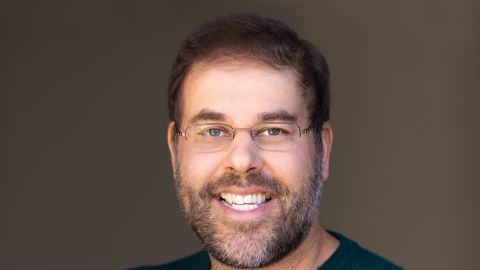

The US faces urgent threats abroad and at home. Just a partial international list includes a warming planet, global shortfalls of food and energy, an assertive China, an aggressive Russia and the malign intentions of Iran and North Korea. On the domestic front, advocates of authoritarianism have hijacked part of the Republican Party, intolerant voices among progressives seek to restrict freedom of speech, anti-Semitism is ascendant in the extreme right and left and growing numbers of Americans on both sides of the political divide regard their opponents as not just wrong but “enemies.”
We do not expect citizens to reject partisanship in the upcoming midterm elections. We do not anticipate many minds will change on the big policy issues – indeed the authors of this commentary differ politically with each other. But we believe, based on our nation’s history and enduring values, that our fellow citizens can step back and ponder who has the qualities to lead in a time of such turbulence and division.
Your party’s candidate should not get your vote if he does not have the character, skills, or intelligence to serve his citizens in challenging times. If she cannot inspire you with hope, courage, and integrity, your party’s nominee does not merit your support. This was Abraham Lincoln’s message, more than 150 years ago, and it was only partially heeded by voters after his death, resulting in some of the lasting divisions that still threaten our democracy.
No one knows where the tumult of our time will lead; no doubt more surprises await. Historically, moments of transition produce unanticipated consequences with long-lasting effects. The generation that came of age in the late 1920s did not foresee the Great Depression or the Second World War. The postwar generation did not predict the Civil Rights Movement or the Vietnam War. Presidents Dwight Eisenhower and John F. Kennedy were two of many commanders-in-chief to express astonishment at how fast the world changed around them.
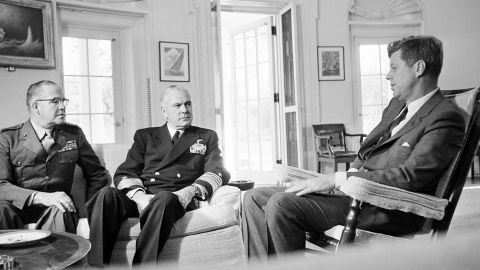
Even with all of their personal experience and expert staffs, they struggled to keep pace. Kennedy, despite his signature swagger, revealed his fears in the aftermath of the Cuban Missile Crisis, when he admitted to an audience at American University: “All we have built, all we have worked for could be destroyed in the first 24 hours.” After decades of constructing a vibrant republic, it seemed everything could disintegrate in a flash.
One does not have to be apocalyptic to feel the echoes today. How close did we come to a coup or a stolen election on January 6, 2021? What would have happened next if Russian President Vladimir Putin had succeeded in his brazen attempt to conquer Ukraine? Might China actually invade Taiwan? Could Covid-19 mutate to become even more contagious and deadly?
The men and women elected to national, state and local offices in 2022 will have to make some rapid, monumental decisions. The most urgent issues may well be ones we have not recognized yet, and those elected will confront dangers they are not prepared for. They will have to adapt and imagine a new – we hope better – future for our country.
What can the study of history tell us about the qualities of leadership that elected officials will need to be ready for the unexpected? Answering that question requires confronting a sobering reality.
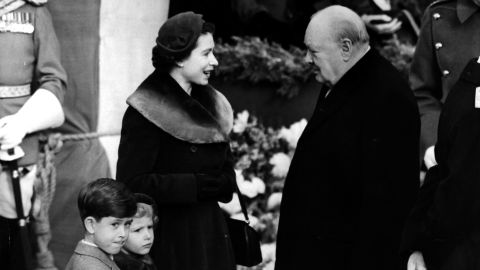
For too long, the United States and our peers around the world have relied on the wisdom and steadiness of aging figures, especially when the future seems so uncertain. President Joe Biden’s election in part embodied that impulse – he ran as a calming grandfather figure, and he will turn 80 just days after the polls close this November. He is our oldest president – and is not even halfway through his first term.
The outpouring of public gratitude for England’s late Queen Elizabeth, who reigned for 70 years, also captures the popular attachment to familiar guides as the terrain becomes more shrouded in fog and filled with predators. Eulogies for the queen on both sides of the Atlantic Ocean have noted Elizabeth’s steadiness, her clear sense of duty and her seven-decade sacrifice of personal interest for the public good.
She anchored a ship of state keeling from rough waves and reckless captains, most recently Boris Johnson. Many non-royalists clung to the queen throughout her commonwealth simply because she represented a commitment to order in a disordered world.
Queen Elizabeth’s death is the latest in a series of funerals for transformative leaders who have departed in the last five years. Some were international statesmen, such as German Chancellor Helmut Kohl in 2017 and, most recently, Soviet leader Mikhail Gorbachev.
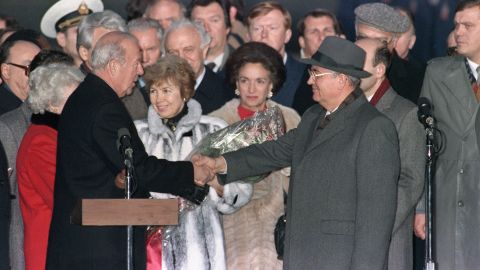
Others were Americans, including President George H.W. Bush and Senator John McCain in 2018, Representative John Lewis and Justice Ruth Bader Ginsburg in 2020 and Secretary of State George Shultz in 2021. We should not gloss over their flaws, which were many and sometimes deep. But the tributes after their recent deaths should give us pause to reflect on what we miss most about them as we look to the future. Their lives reveal what it takes to lead in challenging times, and they offer us valuable perspectives as we cast our ballots this fall.
There are four specific leadership traits from their lives that are particularly instructive today.
First, the ability to grow and change in office to pursue a better future. Such growth was a common trait of the statesmen who worked together to bring the Cold War to a peaceful end, tear down the Iron Curtain and reunify Germany. Americans such as Shultz and Bush, Soviet leader Gorbachev, and then-West German Chancellor Kohl took office overshadowed by Cold War assumptions about East-West conflict. Once in power, they did not deny those differences but still each enlarged their vision to chart a path toward widening cooperation. They also adapted their policies as change within their societies, which they did not control, began to unfold.
In some moments, leadership growth meant jettisoning long-held Soviet policies of suppressing Eastern Europe by force, as Gorbachev did in allowing the peoples of the region to reject Moscow’s dominance. In other moments, it meant embracing a former enemy as a partner for peace, as Shultz and Bush did in partnering with Gorbachev. And for Kohl, envisioning a better future meant overcoming the burdens of history to reunify a Germany that had been divided for almost a half century.
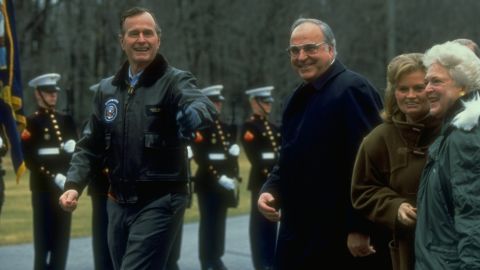
Second, the ability to inspire diverse audiences. Few would disagree that leadership includes inspiration, yet ennobling leaders are largely absent today. Too many political figures fuel hate and resentment, dividing rather than inspiring their followers. (Ukrainian president Volodymyr Zelensky is a rare exception.) Yet, who can forget the enduring inspiration from two decades ago when the Queen explained “grief is the price we pay for love” to a traumatized United States after the September 11th terrorist attacks? Inspiration can often come from authentic directness and simple humanity.
A less well-known, but no less inspiring moment came in 1987 when as President Ronald Reagan’s Secretary of State George Shultz hosted a Passover seder at the US Ambassador’s residence in Moscow. The Soviet Union banned this sacred observance, yet Shultz put the United States on the side of religious freedom in hosting the seder for over 130 Soviet Jews.
A young Jewish dissident finishing a 20-day hunger strike to protest the Kremlin’s oppression implored Shultz: “Keep it up. Just keep it up. You’re the only thing going for us in this world.” Shultz’s presence, and America’s support gave hope to this suffering man and his thousands of fellow dissidents.
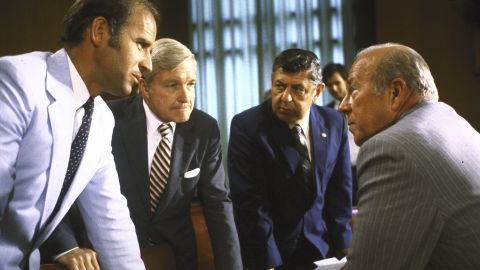
Third, an ability to connect with ordinary people. Great leaders may seem transcendent, but they never lose touch with the people who depend on their leadership. For Gorbachev this meant connecting with and responding to the hopes of young Russians for more openness and freedom. For Bush, it meant understanding the yearning of the German people of both East and West to reunify their families and their country.
For the Queen, it meant taking unprecedented steps over multiple decades to support the Northern Ireland peace process. She never forgot that everyday Catholics and Protestants sought freedom from the violence around them, as they tried to build more hopeful futures for themselves and their children. Even as the politicians remained divided, Elizabeth encouraged cooperation on the ground.
Fourth, and perhaps most important, courage. In the 1960s, just a few years and 10,000 miles apart, two young men – Lewis and McCain – suffered brutal and relentless beatings for their defense of principle. These brave men never broke faith.
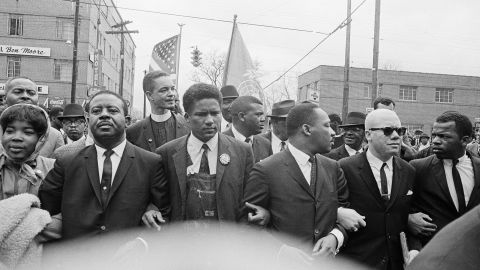
For Lewis, the beatings came at the hands of white supremacists on Alabama’s Edmund Pettus bridge, as he led his fellow civil rights defenders on a march from Selma to Montgomery. For McCain, the beatings came at the hands of North Vietnamese communist guards who tortured him as a prisoner-of-war in Hanoi.
Both men survived, their honor forged by their ordeals. And both would go on to serve for decades in the US Congress where their physical courage shaped their identities as models of integrity and voices of conscience. They led by force of example.
Leaders like these are hard to find. They are not born, but made by years of difficulty and sacrifice – experience is their leadership school. Leaders of this kind, from all backgrounds, are undermined by the hyper-partisan politics of our day that require ideological rigidity and reject growth, inspiration, connection and courage. Figures who have displayed these qualities, like Senator Kyrsten Sinema and Representative Liz Cheney, have found themselves ostracized from their respective parties, subject to vicious death threats, and in Cheney’s case, voted out of office. A democracy cannot function when leaders have to choose between the party line and personal safety.
We do not have to elect men and women who are unqualified for office and who disdain the Constitution. Instead, choose the candidate with the personal qualities to serve her constituents in light of contemporary challenges. And going forward, work to get better candidates in the races you care most about. Or even consider doing the hard work of running for office yourself – our great American experiment in self-government depends on each new generation of citizens heeding the call to service.
With the passing of so many older leaders, the need for fresh faces has never been greater. New candidates possessing the qualities that we describe can help heal our troubled democracy and inspire hope for a better future. And they can appeal to voters hungry for something better.
That is what the great leaders of the past have done. They have steadied the ship of state, building consensus across parties by addressing common problems. Our system can have leaders like that again, if only we are willing to show up and vote for them. That is what must happen this November. Vote for leadership, not cravenness. We can all tell the difference.
Source: https://www.cnn.com/2022/10/08/opinions/what-matters-to-midterm-voters-suri-inboden/index.html















